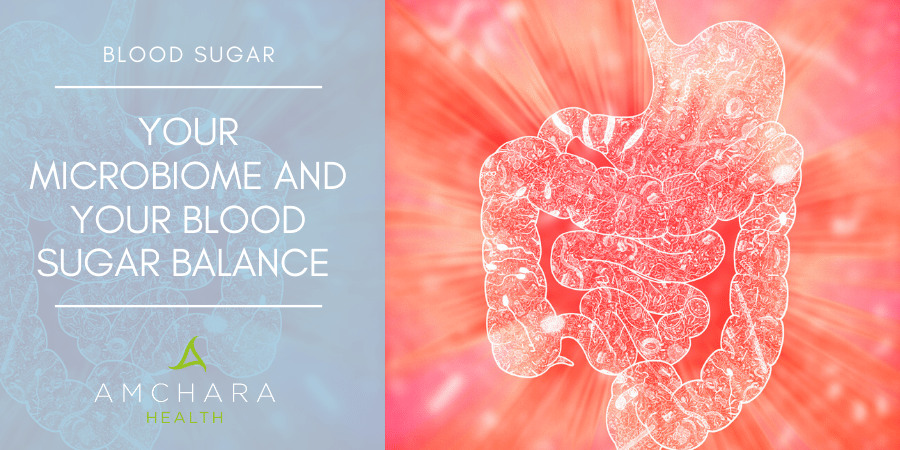It may come as no surprise to hear you have bacteria living within your body and that the greatest numbers reside in your gut. But what may surprise you is the sheer number of bacteria living there, the huge variety of species and the wide range of effects they have on your body.
It was previously thought these bacteria just affected digestion, and if they were out of balance could cause stomach troubles such as wind and bloating. While your gut bacteria balance can indeed cause these symptoms, recent research has revealed their influence reaches much further – scientists are still untangling all the effects these microbes have on our health.
We always take an evidence-based approach and aim to provide you with actionable knowledge and tips to help you on your journey to optimal health. In this article we’ll investigate how your personal population of bacteria can affect the way your body handles glucose.
The importance of balanced blood sugar
Good blood sugar control is important for your overall health. The amount of glucose in your blood should ideally be kept within a very narrow margin; too much sugar can be damaging to cells, and too little leaves the brain jittery and low in fuel.
Each time you eat a meal, glucose floods into your blood. So the body has developed sophisticated mechanisms to balance blood sugar by shunting it into cells to provide energy and into storage areas to be used later.
How does your microbiome affect your blood sugar?
You have trillions of bacteria inhabiting your intestines. In fact it’s estimated these microbes have significantly more genes than we do – possibly as many as ten times more.
The first indication scientists had that the microbiome could affect blood sugar balance was when they noticed that a popular drug given for Type 2 diabetes caused changes in gut bacteria. In fact, the bacteria living in your intestines are now known to influence a whole range of body processes, even those seemingly unconnected with the digestive system. This is because they are constantly producing all sorts of chemicals, which make their way into the bloodstream.
These chemicals can reduce inflammation in the body as a whole, partly by improving the health of the intestinal lining. A gut which has become too permeable – otherwise known as leaky gut – can affect your health in numerous ways because it tends towards increased inflammation. Reducing inflammation can have a beneficial effect on blood glucose control.
Good blood sugar control relies on the pancreas producing insulin, responsible for lowering blood glucose by shunting it into cells. It also needs the cells to be sufficiently sensitive to insulin to be able to react to its message.
Our bacteria secrete substances called short-chain fatty acids (SCFAs) which are thought to be able to improve insulin production and increase insulin sensitivity, as well as slowing down the speed at which the stomach empties, so avoiding spikes in blood sugar (1).
As well as SCFAs, your bacteria also produce hormone-like substances which can influence how your body handles sugar. Other substances released by bacteria travel to the liver and affect the way it processes sugar.
Personalised blood sugar response
Glycaemic response is the effect food has on your blood sugar levels after it’s been eaten. It was previously thought this response was similar in each of us, leading to the development of the glycaemic index, a chart predicting the capability different foods have to affect blood glucose levels.
However, we now know each person’s unique microbiome means we all have a different glycaemic response to similar foods. It appears this reaction can be significantly dissimilar depending on your individual bacterial makeup in the microbiome. In other words, foods high up on the glycaemic index scale may cause a spike in blood sugar in one person while another may be relatively unaffected, and foods traditionally thought of as low glycaemic may cause a sharp rise in blood sugar for other individuals.
Because your gut bacteria interact in this way with the food you eat, one person’s ideal food choices will be different to another’s (2).
One exciting aspect from the discovery that our personal microbiome can influence our glycaemic response is if your gut bacteria is analysed, for example by examining the stool, we can begin to predict how a person may respond to specific foods. This can make it easier to determine what sort of food choices will be beneficial to them.
In fact, scientists discovered that knowing the makeup of a person’s gut bacteria enabled them to predict blood sugar response over 60% of the time, whereas if researchers simply took into account the amount and type of carbohydrates consumed, they were only able to predict glycaemic response on average 36% of the time (3).
How to encourage healthy bacteria
When you have an imbalance in the bacteria in your gut, it means the beneficial bacteria won’t be communicating properly with your cells. Fortunately, there are several lifestyle and nutritional strategies you can adopt to encourage the good bacteria to regain the upper hand.
Bacteria which are beneficial to our health and those which are not thrive in different environments in the intestines, so it’s all about creating the kind of environment preferred by the good bacteria.
- Shun sugar
Many of the foods which spike your blood sugar also adversely affect your microbiome – disease-causing bacteria adore sugar. Try not to rely on artificial sweeteners instead of sugar, because there’s evidence they may adversely affect your gut bacteria too (4).
- Feast on fibre
Feed your good bacteria by eating plenty of foods containing natural plant fibre. Although your body can’t digest fibre, it’s fermented by the bacteria in the large intestine, and this helps them to thrive.
Fibre exists in two main types – insoluble, largely the outer husk of grains and popularly known as roughage, and soluble. Soluble fibre, as its name implies, dissolves in water and then forms a gel-like substance in the colon.
While insoluble fibre adds bulk to the stool and prevents constipation, soluble fibre is the type of fibre which feeds the microbiome.
Because soluble fibre can boost the population of beneficial bacteria, you’ll often see it referred to as prebiotic fibre.
In order to maximise your intake of soluble fibre, consume the following fruits and vegetables regularly:
- Apples
- Onions
- Bananas
- Jerusalem artichoke
- Asparagus
- Leeks and garlic
- Legumes and beans
- Sweet potato and squash
Some people find if they start eating these foods they experience gas and bloating. This can be due to natural fluctuations in the resident gut bacteria and often subsides over time. If this applies to you, introduce these foods gradually.
It is of note that slightly unripe bananas are particularly beneficial as they contain a special type of carbohydrate, called resistant starch, which acts like fibre by feeding the microbiome.
If symptoms persist, it could be an indication you’re suffering from Small Intestinal Bacterial Overgrowth (SIBO), which occurs when bacteria usually residing in the colon establish themselves in the small intestine. SIBO can be tricky to manage, but a Personalised Health practitioner can advise on strategies to rebalance your bacteria in the correct location.
- Avoid unnecessary antibiotics
These drugs can be lifesavers when used in the correct situation, but used inappropriately can wipe out all bacteria, good and bad. It can take years for microbiome balance to recover after antibiotic use, as pathogenic bacteria tend to multiply to fill the gap after antibiotics have killed off the good bacteria. Indiscriminate antibiotic use can also lead to infectious bacteria becoming resistant.
- Try fasting
Fasting, in other words going without food for a specific period of time, can influence the makeup of your gut bacteria.
One specific type of bacteria, known as Akkermansia, flourishes when you don’t eat (5). We know this species of bacteria is able to reduce inflammation in the body and in studies, people with plenty of Akkermansia in their gut had better blood sugar balance. Scientists have discovered inflammation and blood glucose balance are closely linked.
- Consider a probiotic
Probiotic supplements contain concentrated levels of the most common types of beneficial bacteria, such as Lactobacillus and Bifidobacterium.
The rationale behind taking a probiotic supplement is that the beneficial bacteria will then crowd out the non-beneficial types and create the environment in which they like to thrive. Supplementation with probiotics has been seen to improve fasting glucose levels, even in people who’ve already developed Type 2 diabetes (6).
- Relax!
Even stress can affect the balance of bacteria residing in your gut. This is because stress and tension affect your digestive function, effectively slowing it down. This can change the environment inside the intestines to one favouring non-beneficial types of bacteria.
While you can’t avoid stress completely, you can control how you respond to it. Try yoga, meditation, deep breathing or Tai Chi.
Takeaway
Adopting the measures above can help support your microbiome, but as we’ve seen, the precise makeup of the bacteria in your gut will determine how you respond to the foods you eat. From this we can see how pivotal good gut microbial balance is for effective blood sugar control and overall health.
If you would like to explore how your personal microbiome may be affecting your blood sugar levels, an Amchara Personalised Health practitioner may recommend a stool test which can examine the bacteria residing in your digestive system as well as the signalling molecules they are producing. With this information, personalised nutritional and lifestyle modifications can provide you with tools to support you on your journey to optimal health.
We believe sharing knowledge and experience can help us to help others.
We would love to hear your views and experiences.
Did you find this article useful?
Please share your thoughts in the comments.
Read this next:




